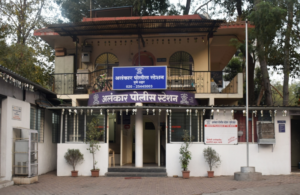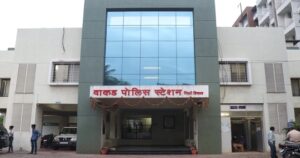Vice President Naidu says loan waivers are not long-lasting solutions

The Vice President, Shri M. Venkaiah Naidu with the faculty members of Vaikunth Mehta National Institute for Cooperative Management, at the Convocation, in Pune, Maharashtra on March 25, 2019. The Governor of Maharashtra, Shri C. Vidyasagar Rao and other dignitaries are also seen.
Pune : The Vice President of India, Shri M. Venkaiah Naidu has called for a renewed focus on agribusiness, value addition and diversification of agriculture to make farming much more sustainable, profitable and rewarding. He was addressing the gathering at the Convocation of Vaikunth Mehta National Institute for Cooperative Management (VAMNICOM), a premier cooperative management institute focusing on Agri-Business Management in Pune, Maharashtra today. He also awarded medals to 3 achievers and presented Post Graduate Diplomas to 51 graduating students.
The Vice President applauded the vision of inclusive and sustainable growth that VAMNICOM, an institution named after Vaikunth Bhai Mehta the Minister of Finance and Cooperation of the then Bombay State and the first Chairman of Khadi and Village Industries Commission. He termed the contributions of Shri Mehta as ‘foundational to cooperative sector in India’.
Shri Naidu opined that Cooperative societies that are built on values that encourage cooperation, empowerment, and solidarity, rather than just profits, play a crucial role in strengthening rural economy and in ensuring socio-economic development for inclusive growth and sustainable development. He said that the cooperative sector has a big role to play in bridging the urban-rural divide and creating opportunities for income generation at grass-roots level.
The Vice President said that Cooperatives can help the small and marginal farmers who are in need of support in the form of inputs, harvesting, storage facilities, distribution channels and a network of the market information system. ‘They can help in mitigating rural distress by providing support facilities for farmers to ensure sustainability’, he added.
Shri Naidu spoke about the need to restructure our agricultural markets by removing middlemen and intermediaries, thereby helping farmers to directly interact with the consumers. He cited the national agricultural market, e-Nam as initiative that would greatly help farmers in this endeavour and said that e-Nam.
Pin pointing the issues faced by agriculture sector such as the rising cost of inputs, depleting water resources, lack of an organized market mechanism and the vagaries caused by climate change, the Vice President said that there is a need to make agriculture more profitable and ecologically sustainable.
Shri Naidu said that there was a need to introduce structural changes in the agriculture sector on a priority basis to ease agrarian distress. ‘The foremost need in the country is to double the income of the farmers by making agriculture resilient, sustainable and profitable’, he added.
The Vice President said that infrastructure development is one of the key factors to improve the agriculture sector and empower the farmers. ‘Improving rural road connectivity, setting up more godowns, cold storage facilities, ensuring assured water and electricity supply are some of the key measures which could be implemented’, he suggested. Rural infrastructure can help in value addition by improving the ease of activities such as paddy milling, oil seed crushing and processing fruits.
Shri Naidu spoke about the importance of providing timely, affordable credit to farmers in addition to providing a much more attractive crop insurance scheme. He stated unequivocally that populist measures such as loan waiver and providing free power supply would not help the farmers in the long run and are not permanent solutions. He opined that the farmer does not need freebies but proper marketing conditions to sell his produce. ‘There is also a need to remove restrictions on the movement of Agri-produce and free export should be allowed’, he added.
The Vice President also said that our farmers should be educated on the need to diversify crops and take up allied farm activities and encouraged to take up horticulture and the cultivation of cereals and pulses.
Shri Naidu suggested that the extension officials should be made to spend more time with the farmers. He added that visiting fields and staying with the families of agriculturists should be mandatory for students of agriculture to help them understand first-hand the problems faced by farmers.
The Governor of Maharashtra, Shri C. Vidyasagar Rao, the Secretary, Dept. of Agriculture Cooperation & Farmers Welfare, Ministry of Agriculture & Farmers Welfare, Shri Sanjay Agarwal, the Addl. Secretary, Dept. of Agriculture Cooperation & Farmers Welfare, Ministry of Agriculture & Farmers Welfare, Ms. Vasudha Mishra, the Director, Vaikunth Mehta National Institute of Cooperative Management, Dr. K.K. Tripathy and others were present on the occasion.
Following is the text of Vice President’s address:
“I am delighted to attend the Convocation Ceremony of Vaikunth Mehta National Institute for Cooperative Management (VAMNICOM), a premier cooperative management institute and a pioneer in offering two-year full time residential Agri-Business Management programme at the post graduation level.
I am confident that the youngsters who graduate from this course will have a successful career in the Agri-business sector, including agri input sector, rural finance and banking.
First, let me congratulate the students who have been awarded degrees. It marks a well-deserved fulfillment of their academic objectives. All the professors, academicians and industry experts who tirelessly assisted the students in pursuit of their knowledge deserve to be lauded as well. I also felicitate the parents and well-wishers, who have supported the students throughout their journey.
While this day will be undoubtedly cherished for years to come by the students, I am confident that VAMNICOM will strive to set new benchmarks in the quest for strengthening the cooperative sector and improving agriculture.
VAMNICOM was set up with the vision of taking India forward with the noble ideology of inclusive growth and collectivization. This institute was named after Shri Vaikunth Bhai Mehta, who was a great visionary and pioneer in the area of rural and cooperative revolution.
The contribution of Vaikunth Bhai Mehta to the cause of Cooperative Education and Training was foundational. He said, “Cooperative Training is not merely a prerequisite but a permanent condition of cooperative activities”. He served as Minister of Finance and Cooperation of the then Bombay State and was the first Chairman of Khadi and Village Industries Commission.
Since its establishment, VAMNICOM has been serving as an intellectual nerve center for the development of agriculture and rural sectors and contributing to the progress of Indian cooperatives.
It has been catering to the needs of the cooperative institutions/agencies and Central/State Government Departments through various short-term and long-term programmes on management training, education, research and also offering consultancy services to Government, cooperatives, corporate entities and others.
Dear students,
Cooperative societies play a crucial role in strengthening rural economy and in ensuring socio-economic development for inclusive growth and sustainable development.
Cooperative Movement acts as an enabler to unify local human resources and channelize energies for the growth of rural India. The Indian cooperative movement, the world’s largest movement, has its own inherent strength and weaknesses. With more than 8 lakh cooperatives, the cooperatives have a significant presence in all the areas of socio-economic activities.
Dairy cooperatives have ushered in milk revolution in the country. AMUL has become a household name. Institutions like IFFCO, KRIBHCO, and AMUL are the big success stories in the cooperative sector. Besides, there are a large number of cooperatives at the state level, like urban cooperative banks, primary agriculture cooperative societies, housing, fishery and other forms of cooperatives which are making untiring efforts to improve the socio-economic condition of the people in the rural areas.
At grass-roots level, the cooperative sector has a big role to play in bridging the urban-rural divide and creating opportunities for income generation.
I am happy that your institution is helping cooperatives improve decision-making skills and administrative competence through the Post Graduate Diploma in Management (PGDM) & Post Graduate Diploma in Co-operative Business Management (PGDCBM), Programmes.
I am happy to learn that the VAMNICOM has been providing active support and guidance to 14 state level institutes of Cooperative Management (ICMs) and five Regional Institute of Co-operative Management (RICMs) through Faculty Development Programmes, apart from providing training on Agricultural Banking.
Built on values that encourage cooperation, empowerment, and solidarity, rather than just profits, cooperative societies play a vital role in providing support and sustainability to rural economic activities.
They are also recognized as means of implementation for the 2030 Agenda for Sustainable Development and the Sustainable Development Goals (SDGs) along with other private sector enterprises.
Cooperatives can help the small and marginal farmers who are in need of support in the form of inputs, harvesting, storage facilities, distribution channels and a network of the market information system.
They must assume a greater role in mitigating rural distress by providing support facilities for farmers to ensure sustainability. Technical guidance is required to help agriculturists in processing their produce and reap benefits through value addition. Not having enough exposure to the changing market mechanism, lack of infrastructure facilities and technical skills are a few of the major obstacles faced by farmers and village artisans.
Faced with competition from the organized sector, they find extremely difficult to maintain their traditional employment. Such trends often create economic distress and result in experienced farmers migrating to urban areas in search of newer livelihoods. If we do not reverse this trend, we will be forfeiting the most valuable human resource that has the knowledge of farming and rural livelihood.
Through pooling of experience, knowledge and by helping one another, cooperative societies can help members to find solutions to problems. Farming cooperatives help farmers to pool their small and fragmented land holdings to take up intensive cultivation by using modern technology.
Agricultural processing cooperatives can provide support towards paddy milling, oilseed crushing, processing fruits, vegetables and so on. The farmers, gain through value addition to their product.
Agricultural marketing societies should enable farmers to benefit from increased bargaining strength. By removing intermediaries they help farmers to directly interact with the consumers. The Government’s e-Nam initiative will greatly help farmers in this endeavor.
Dear Friends,
Agriculture is facing many challenges from the rising cost of inputs and depleting water resources to not having an organized market mechanism and the vagaries caused by climate change.
In India, agriculture has traditionally played a vital role in economic development and continues to do so even till this day. Agriculture, along with fisheries and forestry, is one of the largest contributors to the Gross Domestic Product (GDP).
The current challenge is to make it more profitable and ecologically sustainable. Being the second largest country in the world in terms of agricultural output, India must take the lead in reforming the sector.
The foremost need in the country is to double the income of the farmers by making agriculture resilient, sustainable and profitable. We need to introduce structural changes and both the Centre and various States need to accord the highest priority to this aspect. Concerted efforts are required from every stakeholder to ensure that there is no agrarian distress.
Infrastructure development is one of the key factors to improve the agriculture sector and empower the farmers. Improving rural road connectivity, setting up more godowns, cold storage facilities, ensuring assured water and electricity supply are some of the key measures which have to be implemented. Providing timely credit to farmers is equally important. Of course, as the economy improves interest rates have to be reduced further. The crop insurance scheme should be made more attractive and implemented effectively.
I have always been stating that loan waiver and providing free power supply are not going to help the farmers in the long run. They provide only short term relief. It should be realized that the farmer does not need freebies but proper marketing conditions to sell his produce. There is also a need to remove restrictions on the movement of agri produce and free export should be allowed.
The farmers should also be educated on the need to diversify crops and take up allied farm activities. A study by MANAGE has revealed that there were no suicides in the families of farmers, who took up allied activities.
I feel that the farmers should be encouraged to grow horticulture crops as also cultivate cereals and pulses.
The extension officials should be made to spend more time with the farmers. Similarly, it should be made mandatory for students of agriculture to visit fields and stay with the families of agriculturists to understand firsthand the problems of farmers.
It is a matter of concern that the number of people engaged in agriculture as a percentage of total employment has been steadily going down all over the world. From 43% in 1991, it is now a mere 26% in 2017. In India also, while nearly 64% of the total workforce was engaged in agriculture in 1991, it was down to 44% in 2017.
The Government, Private Sector, Agricultural Universities, KVKs, Scientists and farmers must come together and address the pressing issues of farmers.
We need to have a positive bias in allocating resources to rural areas and help in developing a second income source for those who are solely dependent on agriculture income.
Dear sisters and brothers,
Agribusiness is an important sector and we need a large quantity of skilled manpower at managerial, supervisory and worker levels to give a fillip to this sector. In this regard, Institutions like the VAMNICOM must become facilitators to provide opportunities to those connected with agriculture and allied subjects.
I must compliment VAMNICOM for doing a stellar job in the area of Agri-Business Management by offering a two-year fully residential Post Graduate Diploma in Management (PGDM) – Agri-Business Management (ABM) leading to the award of a degree equivalent to MBA.
I urge upon the youth to tap the innumerous opportunities in agriculture, especially, in the field of agribusiness, agri clinic, and dairy entrepreneurship and become the change agents in making Indian farming a profitable enterprise.
Let me once again offer my congratulations to all students and convey my best wishes for their future endeavors. Finally, I would like to express my deep appreciation to the whole VAMNICOM family. I am sure, you will keep updating your knowledge base and give the students the best possible education.
Jai Hind!”





